Hybrid Car Battery Life: How Long Will Your 2025 Model Last?
Ever wondered how long your hybrid car’s battery will keep you cruising down the highway? As electric and hybrid technologies evolve, knowing hybrid vehicle battery longevity is more important than ever for car owners.
The world of hybrid car batteries is complex and fascinating. Your 2025 model is not just a vehicle—it’s a showcase of advanced automotive engineering. Thanks to battery technology advancements, hybrid car battery life has become a reliable investment.
When you’re thinking about a hybrid vehicle, knowing the battery’s expected lifespan is key. Hybrid car batteries usually last 8 to 10 years, covering about 100,000 to 150,000 miles. This is a big milestone for any car.
Table of Contents
Understanding Hybrid Car Battery Basics
Hybrid car battery technology is a big step forward in car power. Your hybrid car mixes electric and gasoline power. This makes for a smart way to travel today.
Hybrid Car Battery Technology has changed how cars work. It gives drivers a green and efficient ride. These systems work together to improve how your car runs and saves fuel.
What Makes a Hybrid Car Battery Unique?
Hybrid car batteries do more than regular batteries:
- Power electric motor operations
- Support gasoline engine performance
- Capture and store regenerative braking energy
- Automatically switch between power sources
Types of Hybrid Car Batteries
Today’s hybrids use two main battery types:
- Nickel-Metal Hydride (NiMH): Older tech that’s reliable
- Lithium-Ion (Li-ion): Newer tech with more energy
How well a hybrid battery performs depends on a few things. These include the battery type, how you drive, and how well you take care of it. Toyota’s batteries, for example, are made to last about 150,000 miles or 10 years with normal use.
Your hybrid’s battery is a sophisticated energy management system, not just a simple power source.
Knowing about hybrid batteries helps you get the most out of your car. Taking good care of it and driving smart can make your battery last longer.
Factors Influencing Battery Life
Your hybrid car’s battery health is influenced by many factors. These factors affect its life and how well it works. Knowing about these can help you keep your battery in good shape and make your car more efficient.
- Driving habits and patterns
- Environmental conditions
- Maintenance practices
- Battery charging techniques
Impact of Driving Habits
Your driving habits greatly affect your hybrid battery. Aggressive acceleration and short trips can wear it down faster. On average, a hybrid battery loses about 1.8% of its power each year.
But, how you drive can change this rate.
| Driving Behavior | Battery Impact |
|---|---|
| Smooth Acceleration | Minimal Battery Stress |
| Aggressive Driving | Increased Battery Wear |
| Frequent Short Trips | Higher Degradation Rate |
Climate and Environmental Effects
Environmental conditions are very important for your hybrid battery. High temperatures can make the battery wear out faster. Most hybrid batteries keep about 80% of their power after 10 years if they’re well taken care of.
To keep your battery in top shape, drive smoothly, maintain it regularly, and charge it wisely. These actions can help your battery last longer and work better.
Average Lifespan of Hybrid Car Batteries
Knowing how long hybrid car batteries last is important for both buyers and owners. The Hybrid Vehicle Battery Longevity has seen big improvements in recent years.
Today’s hybrid car batteries are very durable. They usually last between 8 to 15 years. This means they can go about 100,000 to 150,000 kilometers before needing a replacement.
Performance Across Different Models
Battery performance can vary between different cars and brands. Several things affect how long a hybrid battery lasts:
- Driving conditions
- Climate exposure
- Maintenance practices
- Battery chemistry
Industry Standards and Expectations
Car makers now offer strong warranties on their batteries. This shows they trust their battery technology. For example, many brands give:
- Up to 8 years of protection
- Coverage for 160,000 kilometers
- Replacement options for significant capacity loss
Keeping your hybrid in good shape is key to its battery’s health. Drive smoothly, charge correctly, and avoid extreme temperatures. This can help your battery last longer.
Signs of Battery Degradation
Your hybrid car’s battery health is key for top performance and efficiency. Knowing the signs of battery wear can help avoid expensive fixes and keep your car running longer.
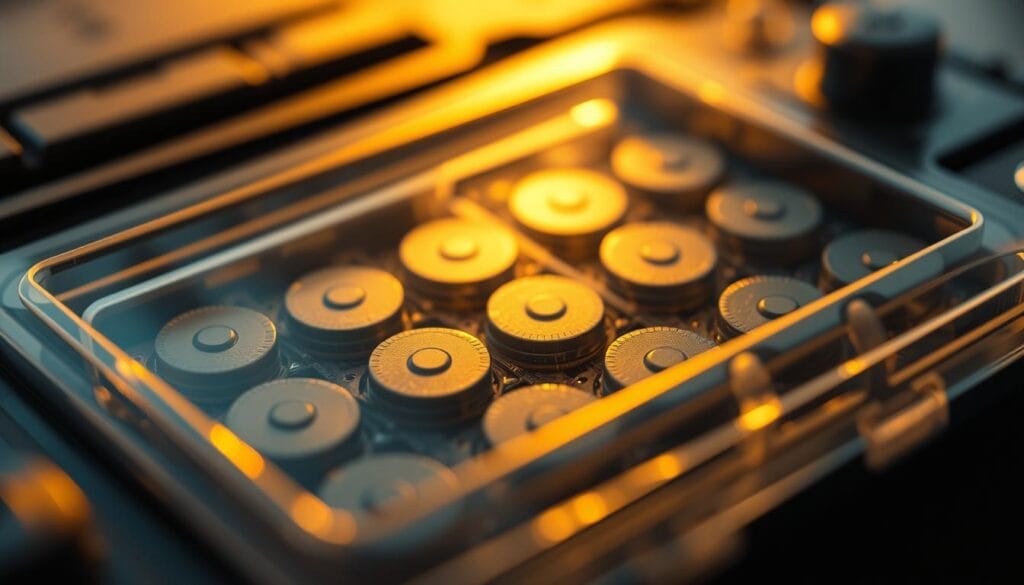
Warning Indicators to Watch
Spotting early signs of battery trouble can save you a lot of money and time. Keep an eye out for these important warning signs:
- Noticeable decrease in fuel economy
- Frequent battery charging needs
- Dashboard warning lights
- Reduced vehicle acceleration
- Increased gasoline engine runtime
“A failing hybrid battery can disrupt the delicate balance between electric and gasoline power systems.”
Regular Maintenance Tips
Keeping up with hybrid car battery care can make your battery last longer. Here are some key tips:
- Do regular diagnostic tests
- Keep an eye on battery charge levels
- Avoid extreme temperatures
- Use apps like Dr Prius for checks
- Get professional battery health checks
Studies show hybrid batteries usually need replacing after 8-10 years. This can cost between $3,000 to $5,000. By being proactive and regular with maintenance, you can keep your hybrid car battery in top shape.
How to Extend Hybrid Battery Life
Keeping your hybrid car battery in top shape is key. It ensures your car runs well for a long time. To do this, you need to drive smart and take good care of your battery.
Looking after your hybrid battery is easy once you know the basics. Your battery’s health is influenced by a few important things you can control.
Best Practices for Battery Care
Here are some top tips to keep your hybrid battery going strong:
- Keep the charge between 20% and 80%
- Avoid letting the battery go completely dead or always charging it full
- Drive gently to not stress the battery too much
- Keep your car in a cool place when parked
- Use eco-mode to ease the battery’s workload
Charging Techniques to Consider
Smart charging is part of good hybrid battery care:
- Charge when it’s not busy to help the grid
- Don’t fast charge too often
- Watch the battery’s temperature while it’s charging
- Stick to the charger your car maker suggests
Regular checks are essential. Toyota says to check your hybrid battery every 5,000 miles. With the right care, your hybrid can last over 200,000 miles, making all your efforts worth it.
Proactive battery care is the key to long-lasting hybrid performance.
Battery Replacement: When and How?
Replacing your hybrid car battery is a normal part of owning a car. Knowing when and how to do it can save you money. It also helps avoid unexpected problems with your car’s performance.
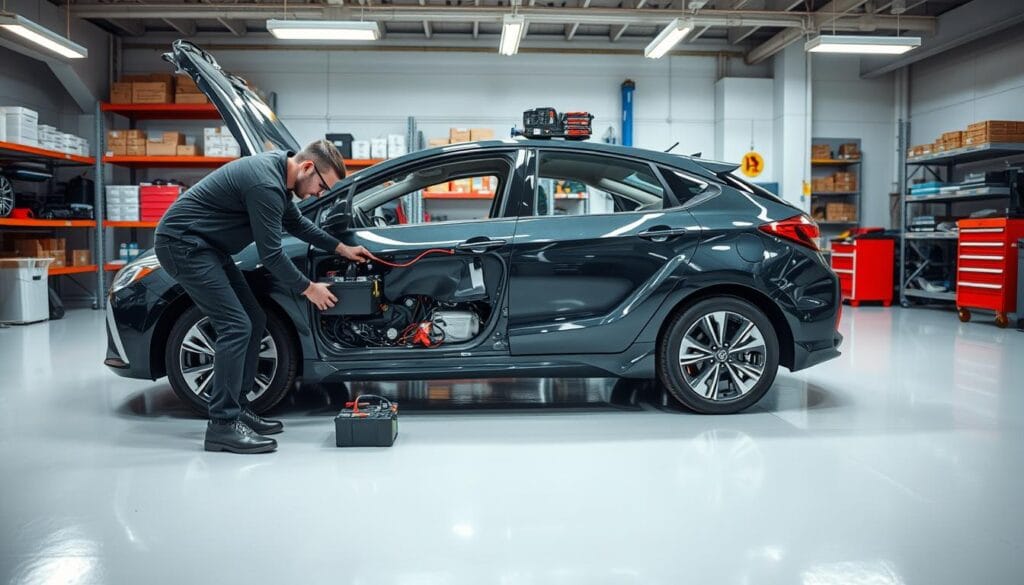
Figuring out when to replace your hybrid car battery depends on a few things. Most hybrid batteries work well for 8 to 15 years. Car makers usually give a warranty for this time.
Timeframe for Replacement
Here’s what you can expect for your hybrid car battery:
- First 8 years: Your battery will work at its best.
- 8-10 years: You might start to see a slight drop in performance.
- 10-15 years: It’s time to get a detailed check on your battery.
Cost Factors to Consider
The cost of replacing your hybrid car battery can vary a lot. It depends on the car’s make and model. Here’s what you might pay:
- Closed-loop hybrid battery replacement: $2,000 – $10,000
- Plug-in hybrid battery replacement: $10,000 – $20,000
- Remanufactured battery options: 40-60% of the original cost
There are smart ways to cut down on replacement costs. For example, remanufactured batteries can be 40-60% cheaper than new ones. A remanufactured battery for a Toyota Camry might cost about $2,090, including installation.
Pro tip: Regular maintenance and annual hybrid health checks can add up to 20% to your battery’s life.
Always talk to your car’s maker and a certified hybrid tech. They can help you find the best way to replace your battery based on your car’s model and age.
The Role of Technology in Battery Longevity
Hybrid car battery technology is changing fast. It’s making us think differently about how we store energy in cars. With electric vehicle sales set to rise, making batteries better is key for everyone.
New tech is making hybrid car batteries more efficient and last longer. Scientists and companies are working on big changes. These could change how we power our cars for the better.
Advanced Battery Management Systems
Today’s hybrid cars have smart battery systems. These systems help use energy better and make batteries last longer. They watch over many things:
- Real-time temperature control
- Precise charging management
- Energy distribution optimization
- Predictive maintenance tracking
Innovations in Battery Chemistry
New research is bringing big changes to hybrid car batteries. Some exciting developments include:
- NAWA Technologies‘ Ultra Fast Carbon Electrode: Boosts battery power by 10 times and makes batteries last 5 times longer
- SVOLT’s cobalt-free batteries: Can take cars up to 500 miles on one charge
- University of Eastern Finland’s hybrid anode: Uses silicon instead of graphite to increase battery size
These new technologies are not just small updates. They could be major changes in how hybrid car batteries work. As research keeps going, we’ll see even more amazing advancements soon.
The Environmental Impact of Hybrid Batteries
Hybrid car battery technology is key in reducing the environmental impact of cars. As people care more about the planet, knowing how hybrid batteries affect the environment is vital.
Creating and getting rid of hybrid batteries is a big challenge. But, it’s also a chance to make cars better for the planet. Car makers are working hard to make this happen.
Recycling and Disposal Innovations
Recycling hybrid batteries has improved a lot. Some big steps include:
- Improved ways to get minerals back
- Less water used in making batteries
- Better ways to separate materials
*The future of sustainable transportation lies in our ability to create a circular economy for battery materials.*
Sustainable Manufacturing Processes
Now, making hybrid batteries is linked to being green. Some new ways include:
- Using green energy to make batteries
- Getting minerals in a way that’s gentler on the planet
- Using less water in making batteries
By 2030, most lithium will go into EV batteries. This shows how important making batteries sustainably is. Big car companies aim to cut their environmental impact. They plan to add 30,000 green charging stations by 2030.
Choosing a hybrid car helps the planet. As hybrid battery tech gets better, so do the environmental gains.
Government Incentives and Programs
Buying a hybrid car can save you money, thanks to government incentives. Federal and state programs offer big financial benefits. They help lower the cost of buying a hybrid car and its battery.
The federal government gives big tax credits to buyers of hybrid and electric cars. In 2025, you can get up to $7,500 in tax credits. But, there are rules about Hybrid Vehicle Battery Longevity that you need to know.
Federal Tax Credit Breakdown
- Maximum credit of $7,500 for qualifying vehicles
- Income thresholds for eligibility:
- $300,000 for married couples filing jointly
- $225,000 for heads of households
- $150,000 for individual filers
- Vehicle must meet battery component and critical minerals requirements
State-Specific Incentive Programs
Many states also offer extra incentives for hybrid car owners. These programs give more money for battery replacements and help you own a sustainable vehicle.
| State | Battery Replacement Incentive | Additional Benefits |
|---|---|---|
| California | Up to $4,000 | HOV lane access |
| New York | $2,000 rebate | Reduced registration fees |
| Colorado | $5,000 tax credit | Free charging station installation |
To save the most money, look into both federal and state programs. Remember, tax credit rules can change every year. So, keep up with the latest Hybrid Car Battery Life incentives.
Comparing Hybrid to Traditional Vehicles
When looking for a new car, knowing the difference between hybrids and traditional cars is key. Hybrid Car Battery Technology has changed the car world. It brings big wins in how cars perform and use energy.
Hybrid cars are way more efficient than cars that run on gasoline. Here are some main points:
- Energy Conversion: Traditional cars only use 12-30% of gasoline energy for power
- Regenerative Braking: Hybrids can catch up to 70% of kinetic energy when braking
- Fuel Efficiency: The 2025 Mazda CX-50 Hybrid gets 38 MPG combined
Total Cost of Ownership
Thinking about buying a hybrid means looking at several money matters:
- Initial Purchase Price: A bit more than traditional cars
- Fuel Costs: Much lower over time
- Maintenance: With fewer parts, repairs cost less
- Battery Replacement: Costs between $1,000 to $8,000
Fuel Efficiency and Emissions
Hybrid Car Battery Performance is great for the planet. Plug-in hybrid electric vehicles (PHEVs) can go 15-60 miles on electric alone. This cuts down carbon emissions a lot.
The future of cars is about being efficient and green.
Choosing a hybrid means you’re picking a car that’s good for the planet, your wallet, and performs well.
Future Trends in Hybrid Car Battery Technology
The world of hybrid car battery tech is changing fast. New discoveries are set to make your drive better than ever. With a 40% jump in battery demand in 2023, expect hybrid batteries to get much better.
New tech is changing Hybrid Car Battery Technology. Sodium-ion batteries could cut costs by up to 20% compared to lithium-ion. Scientists are also working on better cooling systems and AI to make batteries last longer and cars perform better.
The next decade will see big changes in hybrid cars. Plug-in hybrids could grow by 75% in 2024, and battery prices will drop by almost 14%. This means more affordable and advanced hybrid cars. You can also expect better battery management systems for better performance and sustainability.
In the future, hybrid cars will keep getting better. Batteries will be smaller, more efficient, and better for the planet. As making batteries gets cheaper, more people will choose hybrid cars for their advanced features.

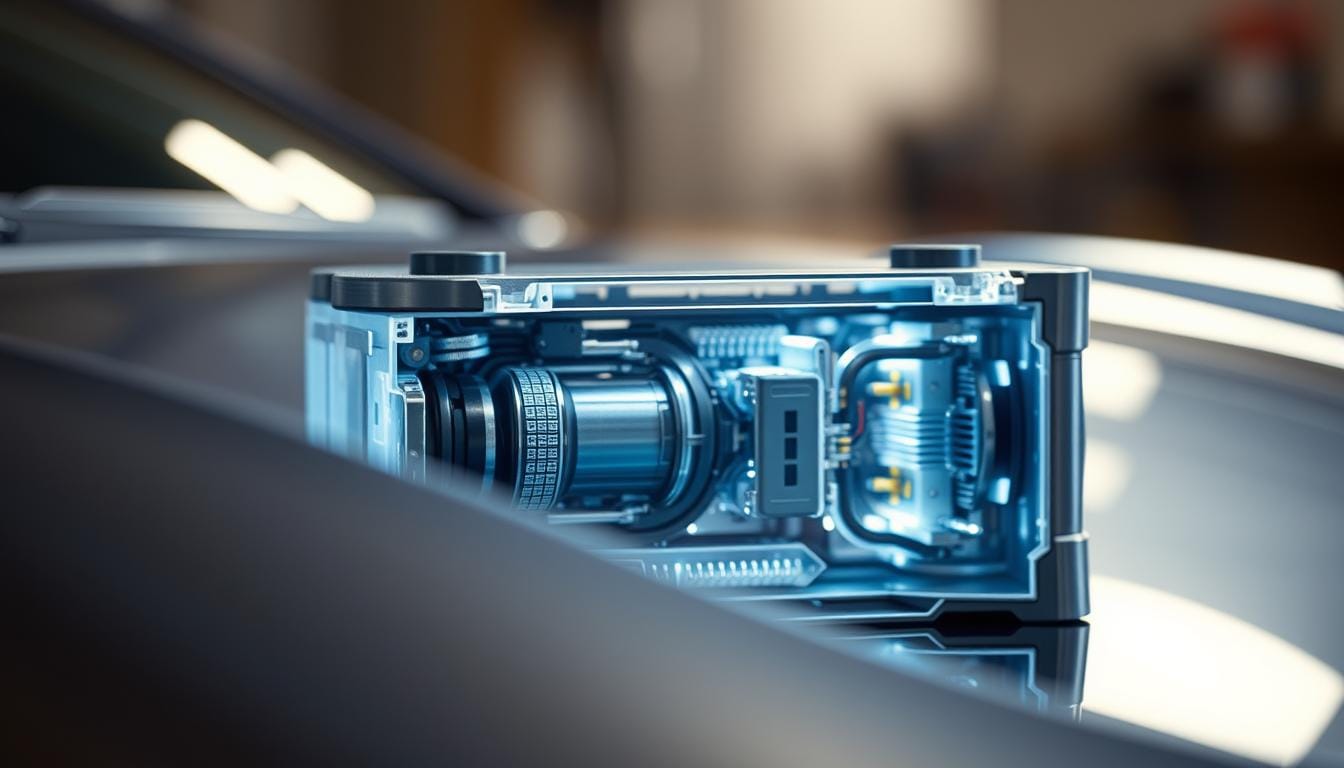

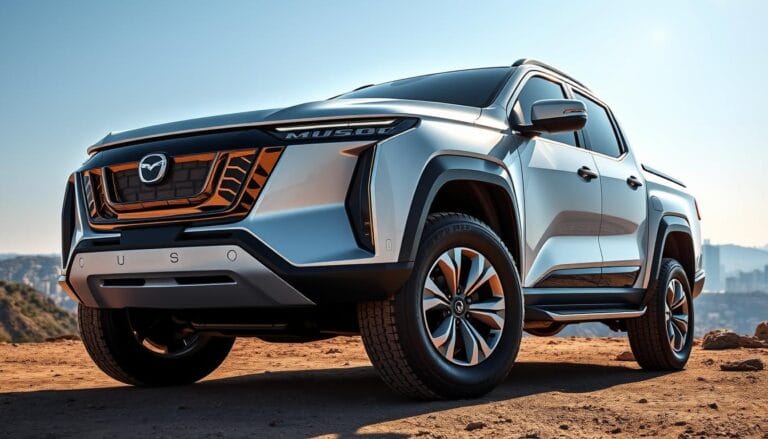
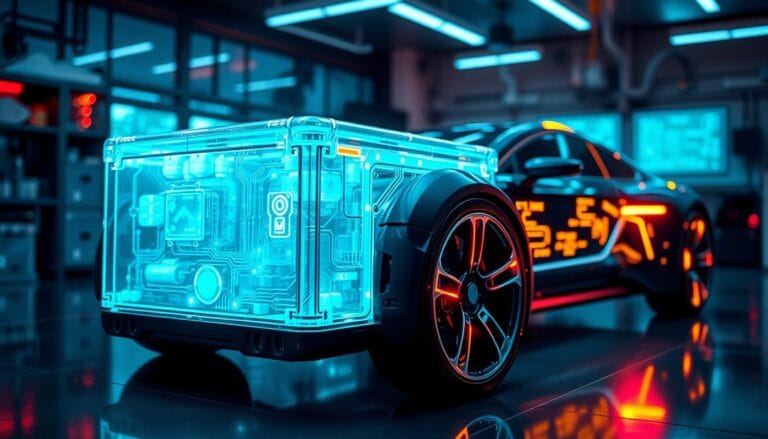
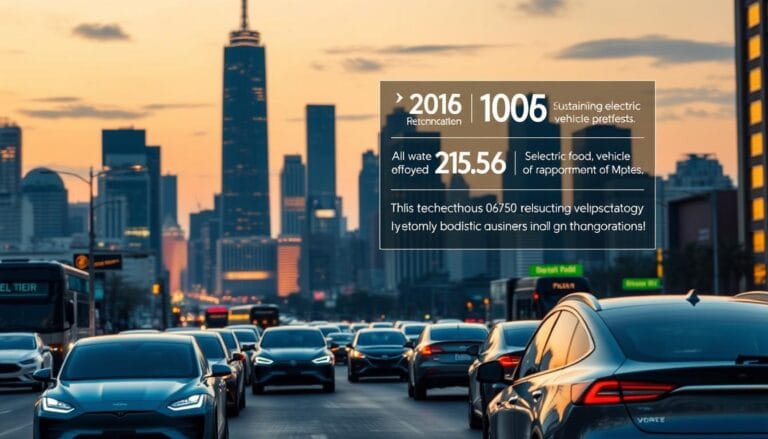
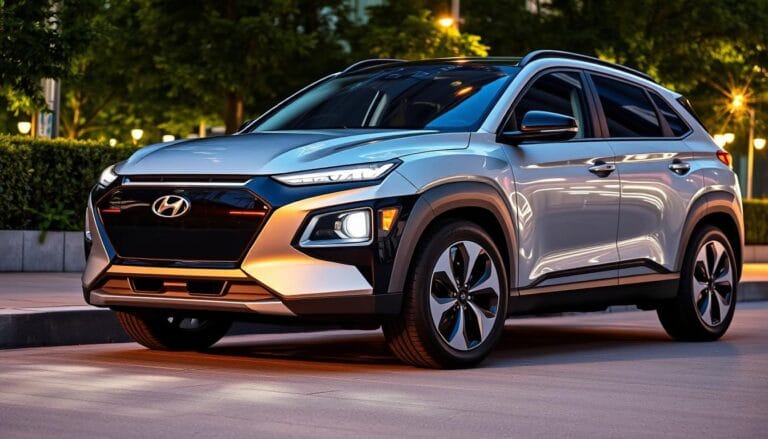

2 Comments
Comments are closed.